List of beautiful Sanskrit (classic) words with meaning
Namaste friends, how are you doing today? Welcome to #BhagavanBhakthi website / blog.
Bhagavan Lord Sri Vishnu blessings to you and your family!
In this website / blog, you will always learn about #Hinduism #Sanskrit language.
Also subscribe to my YouTube channel from this link #BhagavanBhakthi to view videos about #Hinduism #Sanskrit language.
Just before going to “List of beautiful Sanskrit (classic) words with meaning“, let us have some brief information.

Sanskrit has been the ‘adi bhasha‘ (Grand first language) of the world.
Without Sanskrit no other languages of the world can exist.
Either directly or indirectly all the languages are taken from the great Sanskrit language itself.
It may be Europe or Africa, or Chinese or Japanese, or Arabic or any language on earth is definitely taken from Sanskrit language.
Sanskrit is the most beautiful language on earth.
And not only earth, this language is also spoken in the higher and lower planets –
Starting from the highest planet Vaikuntha in other higher planets like Brahma Loka (Satya Loka), Svarga Loka etc.
Similarly in the lower planets like Atala, Vitala, Sutala, Talatala, Mahatala, Rasatala and Patala in all the planets only Sanskrit is spoken.
Now, let us few of the most beautiful Sanskrit words with meaning:
List of beautiful Sanskrit (classic) words with meaning is as given below:
द्विज (Dvija)– This means, someone who takes birth twice:
This means he is someone who takes birth from the mother first.
And also secondly after the upanayana (Upanayanam) (Janeu) (janeevaara / janevadhari / yagnopaveetham) he is considered as he takes another birth.
Here Yagnopaveetham means a ‘divine thread’ in English.
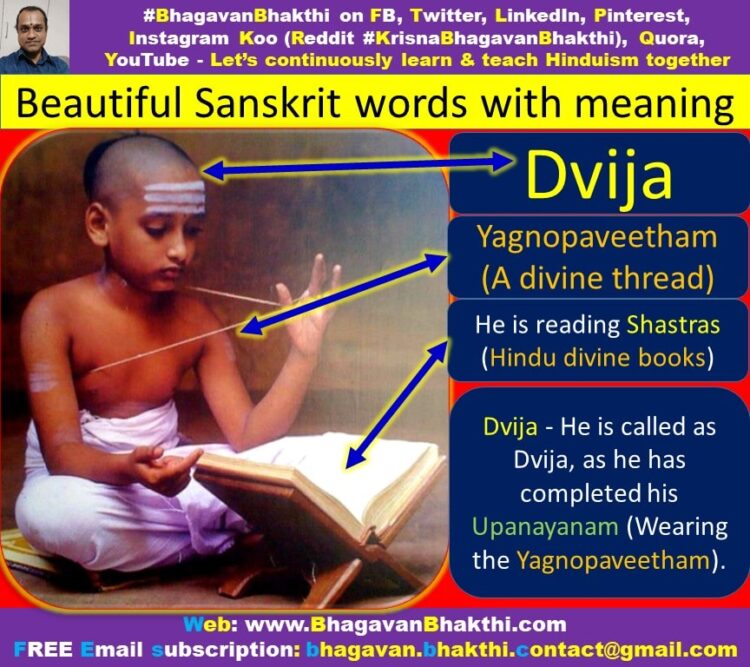
After the Upanayana, that Dvija can start learning about the Sanatana Dharma Shastras (Hindu divine texts).
Upanayana is performed for Brahmanas, Kshatriyas and Vaishyas.
द्विजोत्तम (Dvijattoma)– He is one of the best among the Dvijas.
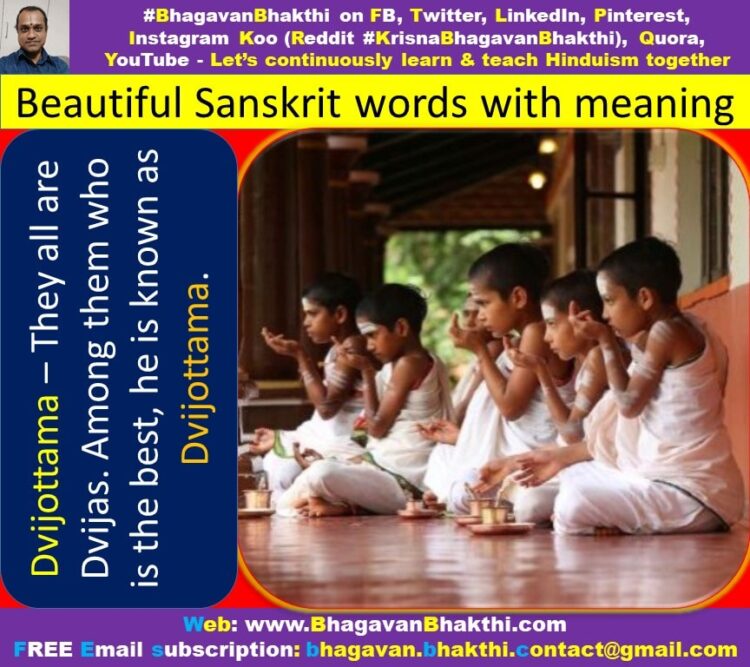
ब्रह्मा (Brahma)– Bhagavan, Parabrahma, Parmeshvara, Sri Hari, Sri Rama, Sri Krishna etc.
Also Sri Chaturmukha Brahma Deva is also called as Brahma.
But the original and one and only Brahma is Sri Hari.
ब्राह्मण (Brahmana / Brahmin)– Someone who has taken birth in Brahmana varna.
This has also another meaning, that is someone who knows about in-depth knowledge about Brahma / Bhagavan.
क्षत्रिय (Kshatriya)– Someone who protects the universe including all the living and nonliving things.
Here Kshatriya = Ksha + tri + ya = Ksha means ‘kshetra’ (place), ‘tri’ means all the three lokas, ‘ya’ a person.
The person who protects all the three lokas is a Kshatriya.
वैश्य (Vaishya)– Usually he is a business person.
शूद्र (Shudra)– He is the someone who helps all the other three varna people, that is:
Brahmana, Kshatriya and Vaishya. Without him (Shudra) nothing moves forward.
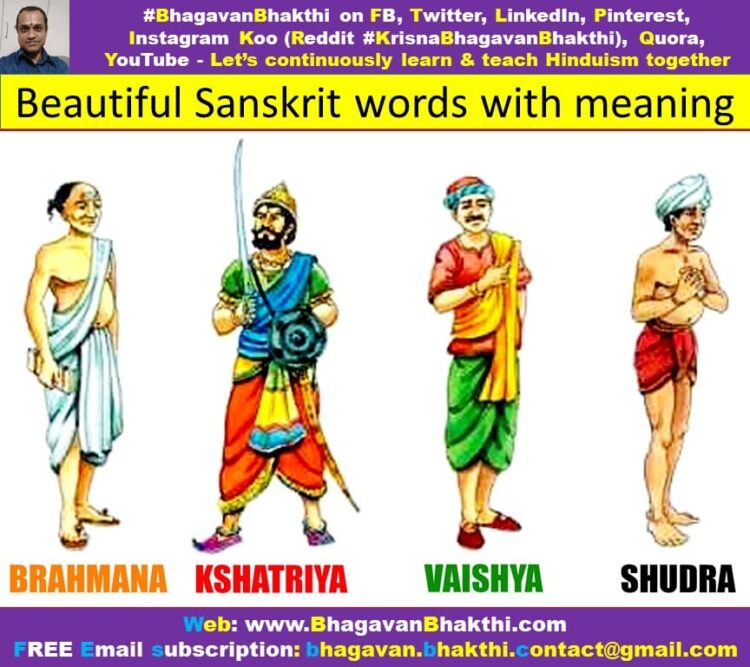
वटु (VaTu) – Someone who has completed his upanayana, but still unmarried.
Usually a person under the age of sixteen years who has completed the upanayana is called as VaTu (वटु / ವಟು / vaṭu).
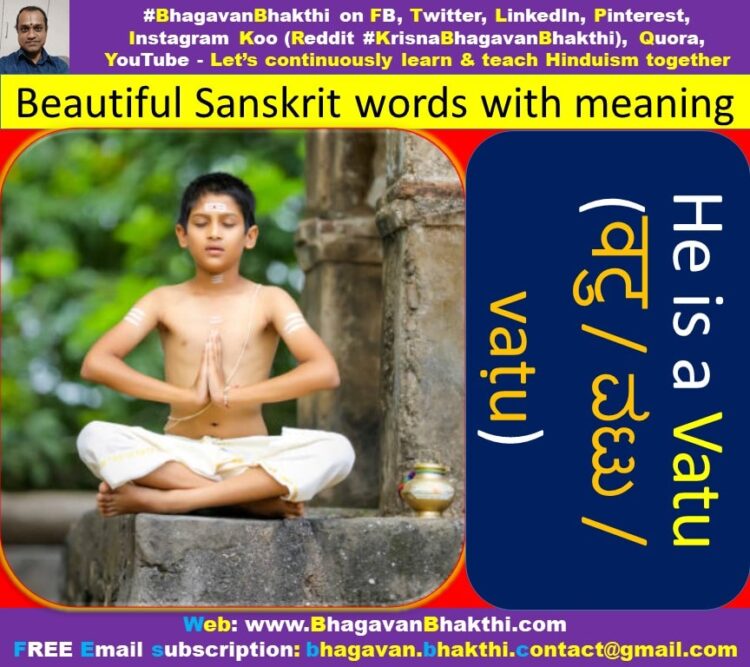
सदाचारी (Sadaachaari) (Sadachari) – He is the one who follows the Sanatana Dharma as per the Sanatana Dharma.
One how reads, understands and teaches the Great Sanatana Dharma is a perfect Sadaachaari.
One who has the jnana (knowledge) of the Shastras, that is:
Mahabharata, Vedas, Ramayana, etc. etc. etc. is a perfect Sadachari.
Also someone who as got the Bhakti, Vairagya, etc. is a perfect Sadaachari.
Here Sadaachari = Sada + achari = Someone always (sada) who performs the achara (ethics) is called a Sadaachaari.
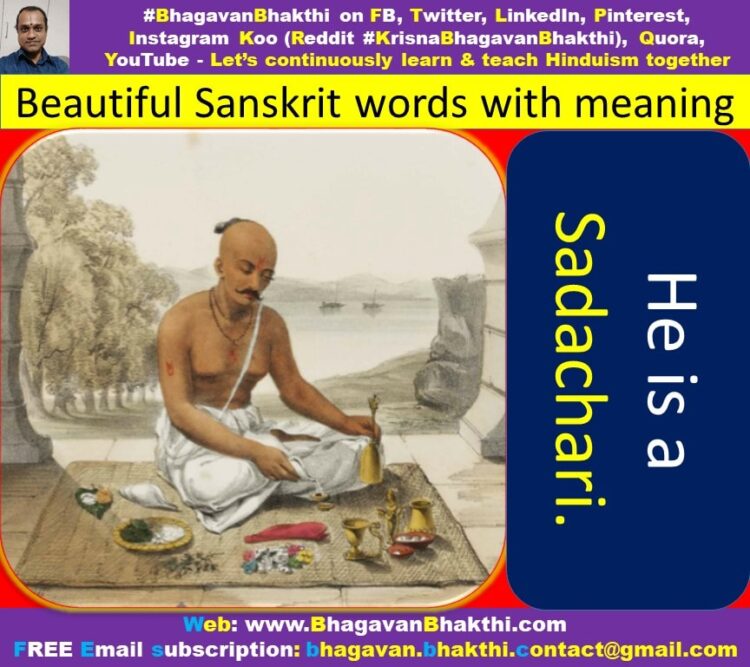
श्रोत्रिय (श्रोतृ) (Shrotriya) (Shrotru) – He is someone who is a good listener, that is –
He is someone who listens the Hindu Shastras in the right way as per Sanatana Dharma.
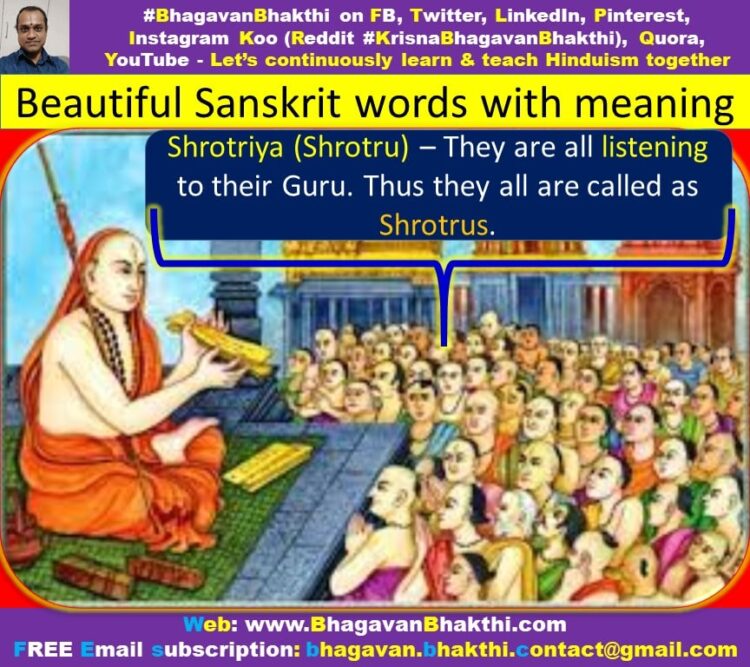
विप्र (Vipra) – Someone who is a learnt Veda Pandita and also who teaches the Vedas is called a Vipra.
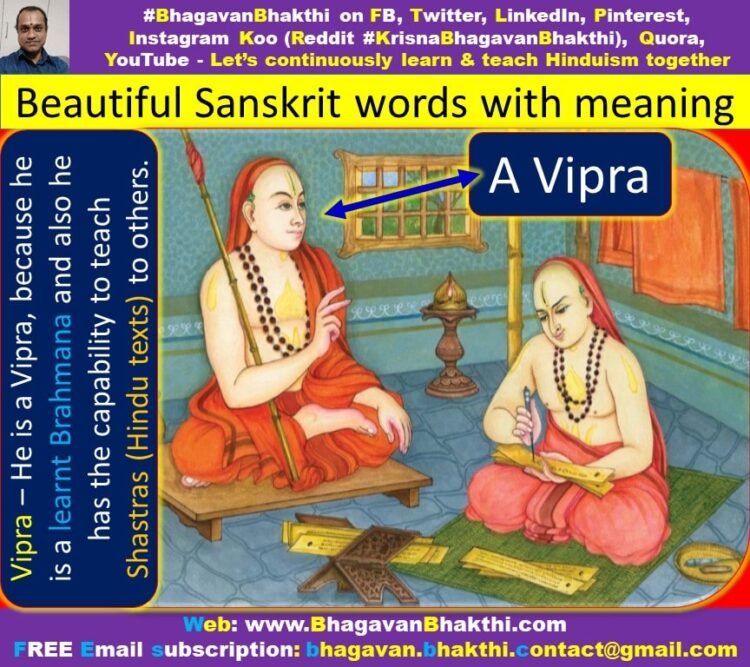
दैविक (Daivika) – Something which is divinely divine place or it can be something else which is a divine thing.
E.g., The greatest planet Vaikuntha is the most and best divine place, as in that planet we can easily get Bhagavan Sri Vishnu and Sri Maha Lakshmi Devi.
Daivika means, a place or a person or a thing or anything which has the presence of Lord Vishnu.
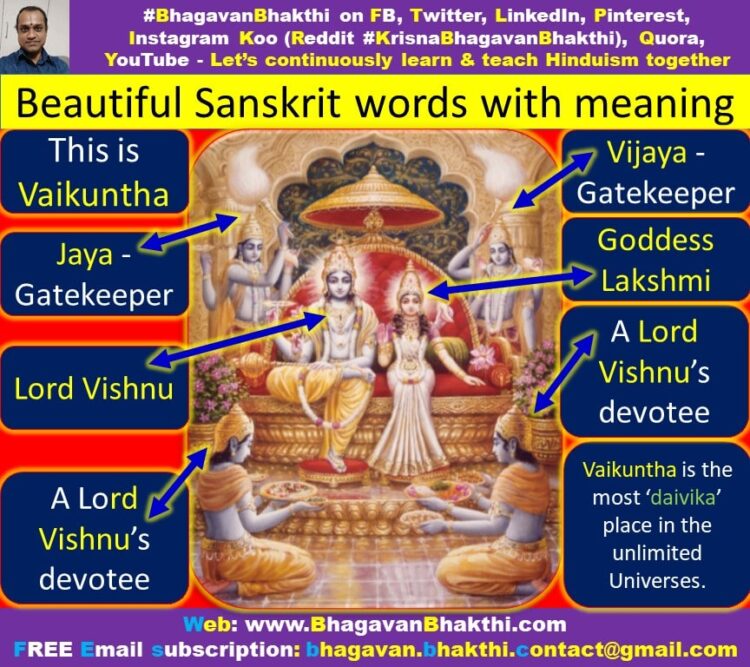
आध्यात्मिक (AdhyAtmika) – Something which is highly divinely spiritual.
E.g., Doing pooja of Bhagavan Sri Vishnu.
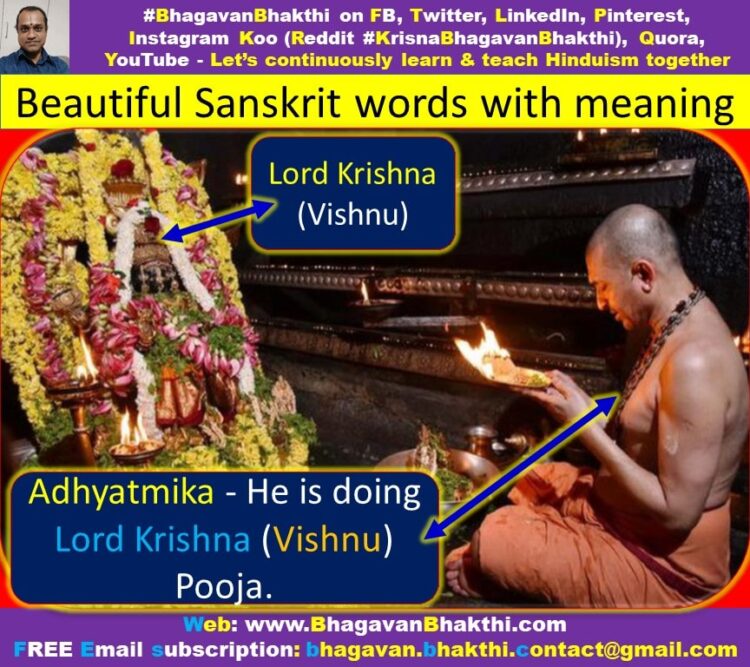
सुरस्त्री (surastrI) – A celestial or divinely woman. E.g., An Apsara like Menaka Devi.
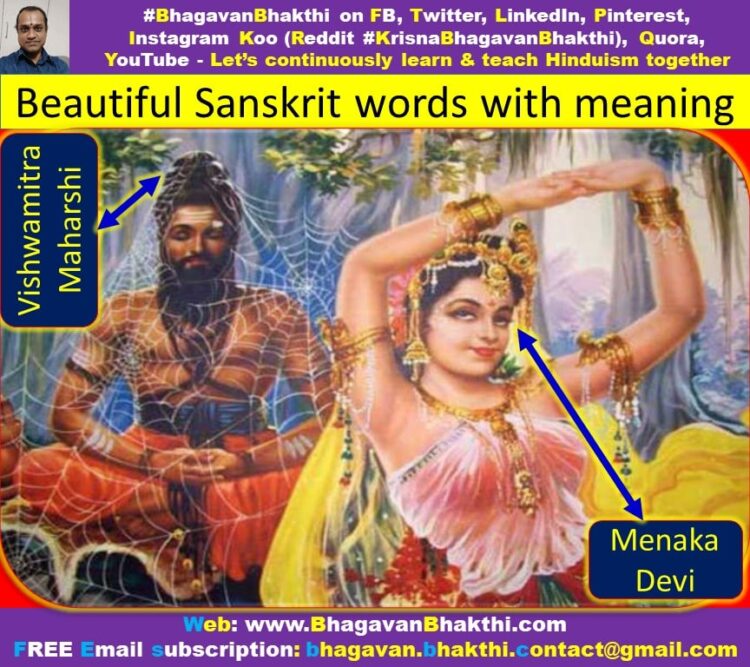
गन्धर्व (Gandharva) – These are group of divine people who have mastered in music including singing, dancing and playing various music instruments.
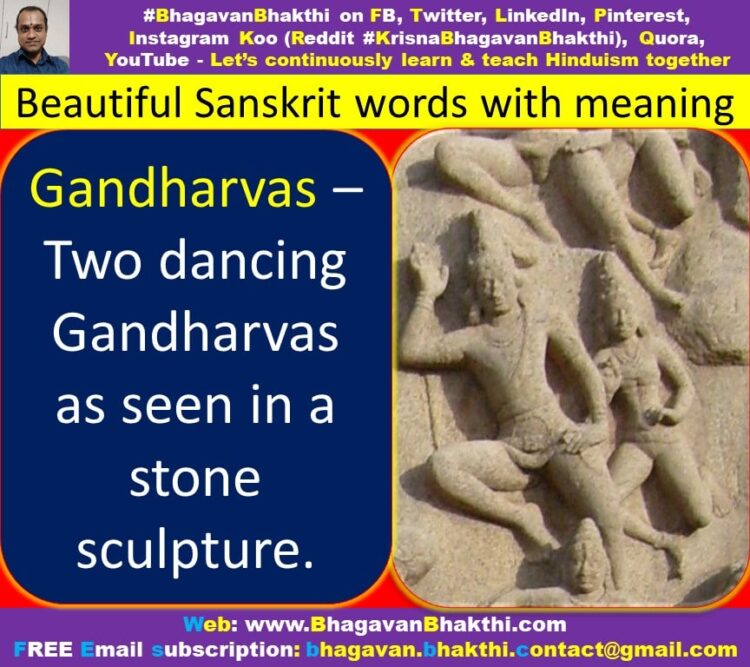
अप्सर (Apsara) – These are the celestial or divine women who stay in the higher planets like Svarga Loka.
E.g., Urvashi (She is born from the ‘uru’ / thigh of Bhagavan Sri Vishnu and thus she is known as Urvashi),
Menaka, Rambha, Tilottama, Ghritachi, Manjukesi, Sukesi, Misrakesi, Sulochana, Saudamini, Devadatta, Devasena, etc.
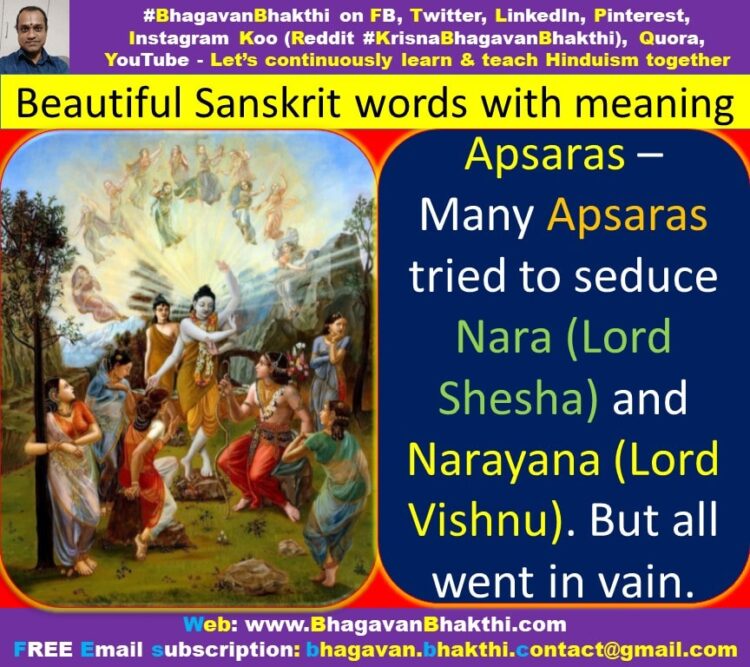
निवास (nivAsa) – A divinely abode. Bhagavan Sri Vishnu’s another name is ‘Srinivasa’.
Here ‘Sri’ means Maha Lakshmi Devi and ‘nivasa’ means living.
This means, Bhagavan Sri Vishnu is living inside Sri Maha Lakshmi Devi and thus he is known as ‘Srinivasa’.
[Please remember Lord Srinivasa (Venkatesha) (Balaji) of Tirupati].
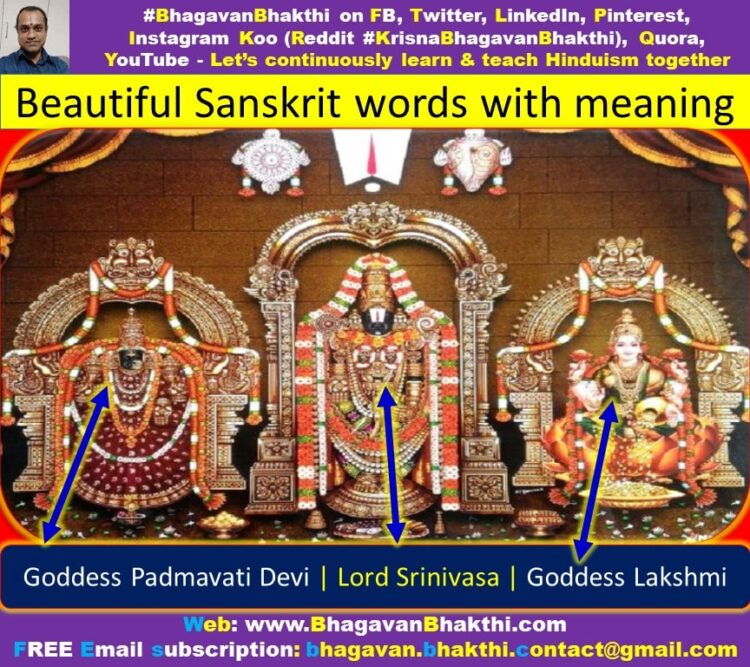
रम्य (ramya) – This word means very pleasant, comeliness, charming, enjoyable, pleasing, delightful, beautiful, lovely etc.
Bhagavan Sri Rama’s ‘र / ra’ has the same meaning.
Bhagavan Sri Rama is the most ‘ramya’.
Lord Rama is the provider of pleasantness, comeliness, charming, enjoyable, pleasing, delightful, beautiful, lovely etc. to his devotees.
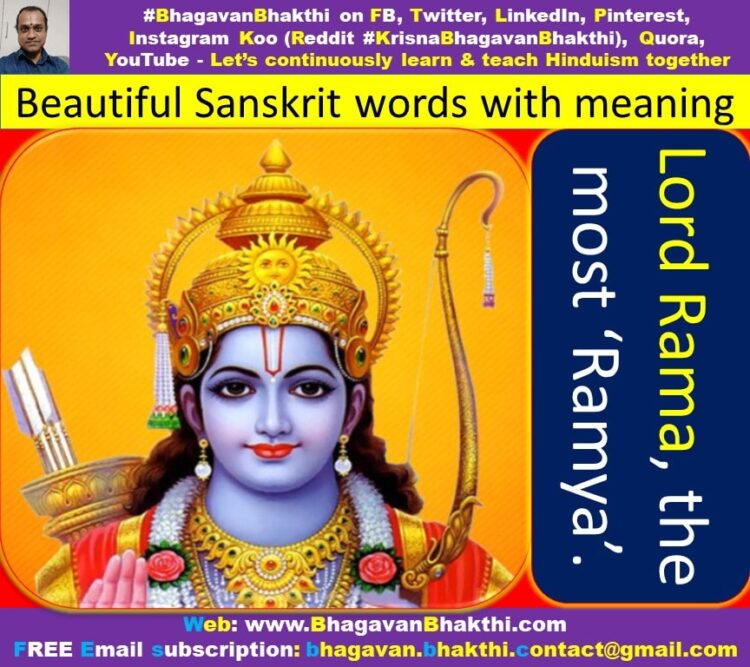
प्रशिक्षण (prazikSaNa) – Giving training.
लक्ष्मी (lakshmi) – लक्ष + मी / Laksha + Mi – Here Laksha means aim and mi means me.
This means, Sri Lakshmi Devi is someone who gives us the aim of our life.
लक्ष्मण (lakSmaNa) – This means divinely lucky. This also means someone who is divinely beautiful.
शृणोति (zRNoti) – This means listening.
मम (mama) / मे / me – This means me, mine etc.
मित्र (mitra) / सख (sakha) – This means friend.
दिक् (dik) – This means direction.
ग्राहक (grAhaka) – This means a customer, a purchaser, a buyer etc.
प्रबन्धक (prabandhaka) – This means a manager.
गर्भपात (garbhapAta) – Abortion.
त्यजति (tyajati) – To abandon, sacrifice.
धर्मचारिन् (dharmacArin) – Someone who follows Sanatana Dharma (dutiful).
शील (sheela) – Character of a person.
शिल (shila) – Statue
दांत (danta) – Tooth (The English word Dental is derived from this word danta).
सम्भोग (sambhōga) – Sexual union between a husband and a wife.
Enjoying sex with the acceptance of both husband and wife.
उपभोग (upabhōga) – Enjoyment (material enjoyment)
More information will be added to this on regular, please visit after some time to know more information.
To watch videos on #Hinduism #Sanskrit language, SUBSCRIBE to my YouTube channel from this below link:
#BhagavanBhakthi YouTube channel
To know more information about “List of Sanskrit words related to sex with meaning“, please click the below link
List of Sanskrit words related to sex with meaning
To know about “unknown facts about Sanskrit language“, kindly click the below link:
Unknown facts about Sanskrit language
Dear friends, if you need any clarifications about this post, kindly let me know, I will definitely try to answer all of them.
Also your one LIKE, one COMMENT, One Share, one SUBSCRIPTION is highly important.
This will help to know the quality of this content and also it will be helpful to know if any improvements is required for the content.
If you feel this content is useful to you and has helped you to improve your knowledge, kindly share this with your well-wishers.
Because “SHARING MEANS CARING”.
For receive FREE EMAIL SUBSCRIPTION about #BhagavanBhakthi, you can send an email to [email protected] from your email ID.
NAMASTE!
Sri Gurubhyo Namaha
Sri Krishnaaya Namaha
Sri Krishnaarpanamastu
Subscribe / Follow us Share in Social Media